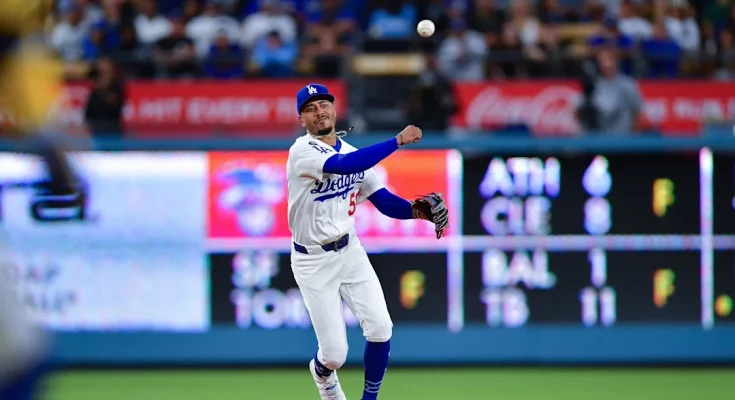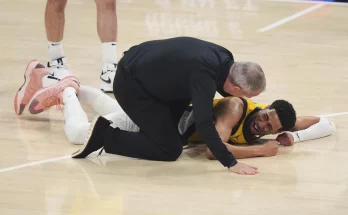When the Los Angeles Dodgers made the bold move of sliding Mookie Betts over to shortstop earlier this season, it was seen as yet another testament to his athleticism, versatility, and team-first attitude. A six-time Gold Glove outfielder, Betts was already a proven superstar at the plate and on the field. But taking on shortstop — a position widely considered the most demanding on the diamond — introduced an entirely new layer of responsibility and scrutiny. Initially, Betts embraced the challenge with the same confidence and charisma that have made him one of MLB’s most admired players. However, in a recent development that has raised eyebrows throughout the league and among Dodgers fans, Betts has acknowledged that the move might be having a negative impact on his offensive performance.
This change of tune is notable because Betts has rarely, if ever, made excuses or pointed to his position as a factor in his offensive struggles. But as the season has unfolded, and as his batting numbers have dipped compared to previous years, the weight of playing shortstop every day may finally be revealing itself — not just physically, but mentally as well. And for a team with World Series aspirations, this admission opens up a larger conversation about role assignments, player fatigue, and what sacrifices are too great, even for a superstar.
Betts began the 2025 season looking sharp at the plate, reminding fans why he’s a perennial MVP candidate. However, as the wear and tear of daily starts at shortstop began to accumulate, there was a noticeable dip in his offensive production. His OPS dropped significantly from his usual levels, and his slugging percentage — one of the more telling metrics for a player of his power profile — dipped into career-low territory for stretches. While Betts remained effective in the field and still provided occasional highlight-reel moments, it was clear something was off.
Initially, Betts didn’t blame the move to shortstop. He attributed his offensive woes to timing issues and cold streaks that all hitters go through. Manager Dave Roberts backed him up, praising Betts for his dedication and insisting that the team had no regrets about the positional shift. But as weeks turned into months and the offensive struggles lingered, the questions got louder. Was it too much to ask Betts to play such a physically demanding position while also being expected to carry a significant load in the lineup?
Then came the admission — subtle but telling — from Betts himself. In a recent media session, Betts confessed that playing shortstop every day may, in fact, be taking a toll on his offensive output. While he stopped short of calling it a mistake, he was honest about the fact that shortstop is unlike any other position he’s played in his career. It requires a different kind of mental engagement, a different kind of preparation, and the cumulative fatigue is very real. That moment of vulnerability was striking for a player who has long been seen as unflappable, and it brought new context to his season-long struggles at the plate.
The reality is that shortstop demands constant motion, quick reflexes, and a level of attention that’s hard to replicate in any other position on the field. You’re involved in nearly every play, expected to be a vocal leader on defense, and your margin for error is razor-thin. For someone like Betts, who has spent the majority of his career in right field and second base — where the defensive responsibilities are less frequent and less physically taxing — the switch represented a seismic shift in daily preparation.
One might assume that a player of Betts’ caliber could adapt to anything — and to his credit, he has. But adaptation doesn’t always come without cost. For all the plays he’s made at shortstop, for all the praise he’s received for stepping up in a time of need after Gavin Lux’s struggles and Miguel Rojas’s limited offensive ceiling, there’s now a sense that something had to give — and that “something” might have been Betts’ bat.
The Dodgers haven’t spiraled because of this, thanks in large part to the continued brilliance of players like Shohei Ohtani, Will Smith, and Freddie Freeman. But they’ve certainly noticed the offensive dip from Betts, especially in key moments. He hasn’t looked as locked in, as dangerous, or as imposing in the batter’s box. And for a team that leans heavily on the top of its order, any slippage from a player of Betts’ stature can have ripple effects throughout the lineup.
So where does this leave the Dodgers and Betts moving forward?
On one hand, Betts’ willingness to be candid about the toll of playing shortstop could prompt the Dodgers to reconsider how they utilize him. They have options, including using Rojas or Lux more frequently at short and sliding Betts back to second base or even right field on occasion. But this would involve reshuffling a roster that has been carefully balanced, and Roberts has been cautious about making too many adjustments mid-season. On the other hand, Betts’ versatility is still seen as an asset — but an asset that may need to be deployed more selectively.
This also brings to light a broader trend in modern baseball: the rise of hyper-versatile players who are asked to do more than ever before. From Betts to Shohei Ohtani to Ronald Acuña Jr., we are living in an era where elite players are often expected to contribute in multiple ways — offensively, defensively, and sometimes even as pitchers or base-stealing threats. But even the most talented athletes have limits. And when you stretch those limits too thin, the returns can diminish.
Betts’ situation is also a case study in leadership. He didn’t have to take the shortstop role. He could have pushed back, cited his comfort level in the outfield, and stayed put. But Betts is built differently. He embraced the challenge because the team needed him, and because he saw it as a way to help win. That kind of sacrifice doesn’t always show up in box scores, but it’s part of what makes him the heartbeat of this team. His recent comments shouldn’t be seen as complaining — they should be seen as an honest reflection of what it means to be asked to do too much, even when you’re Mookie Betts.
The Dodgers have prided themselves on flexibility and depth, but they also know that October baseball is won by stars being stars. If Betts is going to be himself come playoff time, they may need to ease his load before then. Rest days, positional flexibility, and mental breaks may be more important now than ever. Because if Betts gets his swing back, there’s no ceiling for what this team can accomplish.
What’s also at stake here is Betts’ long-term health and productivity. He’s not a 22-year-old prospect bouncing around the diamond — he’s 32, with over a decade of high-level baseball behind him. Managing his workload isn’t just about 2025; it’s about preserving his elite skill set for the seasons to come. The Dodgers have invested heavily in Betts, and with good reason. His presence is transformative — but only when he’s fully locked in and firing on all cylinders. The current version of Betts, grinding through the daily rigors of shortstop while trying to maintain offensive excellence, may not be sustainable.
That Betts has been willing to acknowledge this publicly adds a layer of maturity and honesty that fans and front office executives alike should appreciate. Baseball is a game of adjustments, and the best players — and organizations — know when to pivot. If this season has taught the Dodgers anything, it’s that even the most versatile stars need boundaries. And Betts, for all his gifts, is human.
The coming weeks will be crucial. As the Dodgers prepare for another deep postseason run, every decision will matter — from bullpen matchups to lineup configurations to defensive alignments. Betts’ role will be central to all of it, but maybe in a slightly different capacity than originally envisioned. Whether that means fewer starts at shortstop, more DH days, or simply giving him the mental space to recalibrate at the plate, the message is clear: the Dodgers need Mookie Betts at his best. And if that means redefining what “best” looks like positionally, then so be it.
Betts has already proven his value in countless ways. He’s a champion, a leader, and a player who will go down as one of the most complete talents of his generation. But even the greatest have to make concessions to stay great. In admitting that shortstop may be hurting his offense, Betts hasn’t shown weakness — he’s shown wisdom. And for a team chasing a title, that kind of awareness may be just what they need to finish the journey.



